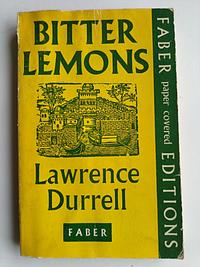You need to sign in or sign up before continuing.
Take a photo of a barcode or cover
Gorgeous and elegiac and poetic and conversational. Just delightful.
I get the impression that Lawrence Durrell was a bit of a cad. Still, he managed to live in some beautiful places at interesting times, and writes about them gloriously.
This book takes place in Cyprus in the 50’s. It’s sleepy backward charm is described in the first half when Durrell moves there to live cheaply and well, building a house, writing poetry and befriending his Greek neighbours. But the tides of Enosis and Greek nationalism soon overtake him and the short-sighted (naive, exceptionalist?) British colonial government. The second half details the island’s civil unrest and the government’s increasingly martial response.
It’s all written with Durrell’s ‘sensitive and muscular prose’ (from one of the reviews on the cover, what exactly does that mean - I can tell you that he was extremely perceptive to beauty and really liked to drink), and very very sad.
4.5 stars. Almost perfect except for the vintage British patronising tone. He loved the Greek ‘peasants’ but found them slightly ridiculous.
I get the impression that Lawrence Durrell was a bit of a cad. Still, he managed to live in some beautiful places at interesting times, and writes about them gloriously.
This book takes place in Cyprus in the 50’s. It’s sleepy backward charm is described in the first half when Durrell moves there to live cheaply and well, building a house, writing poetry and befriending his Greek neighbours. But the tides of Enosis and Greek nationalism soon overtake him and the short-sighted (naive, exceptionalist?) British colonial government. The second half details the island’s civil unrest and the government’s increasingly martial response.
It’s all written with Durrell’s ‘sensitive and muscular prose’ (from one of the reviews on the cover, what exactly does that mean - I can tell you that he was extremely perceptive to beauty and really liked to drink), and very very sad.
4.5 stars. Almost perfect except for the vintage British patronising tone. He loved the Greek ‘peasants’ but found them slightly ridiculous.
emotional
hopeful
informative
inspiring
sad
crafted like poetry, beautiful yet fragile images of cyprus and generous friendships tragically tested and threatened by politicians and war.
Just very slow and not what I was in the mood for. But It describes a beautiful life that I am intrigued by so not sure why I couldnt
As everyhone else says, a beautifully written book which made me long for the sunshine and the islands. But then the book turned dark, and paradise was paradise no more. It's scary to see how quickly - if one is to believe the author - everything changed. One day a haven of peace, the next a nest of terrorists comparable to what we see during present days.
The language is beautiful, but somehow it drowns the seriousness of the Cypriot story by it's wellwrittenness. That's why only four stars.
The language is beautiful, but somehow it drowns the seriousness of the Cypriot story by it's wellwrittenness. That's why only four stars.
informative
sad
slow-paced
informative
medium-paced
Imperialist nonsense wrapped up in gratuitous flowery language.
The author approaches the sensitive topic of the 'Cyprus dispute' with a level of cognitive dissonance that was frustrating; on one hand he acknowledges that the British have full government control over the island and how frustrating it must be for the Greeks (Turks and others are largely ignored) but laments the the residents right to self determination. Greeks and Turks are often belittled as less intelligent and more swayed by emotions whilst any criticism of him is met with defensiveness. His role as a government worker demonstrates this mentality as well.
No doubt there is violence and inexcusable actions by Greeks and Turks but his stance lacks any self reflection to his own place as a British person.
The only saving grace is the few fleeting moments of well crafted lines and interesting bits of history around the colonialism and types of wine he harps on about.
The author approaches the sensitive topic of the 'Cyprus dispute' with a level of cognitive dissonance that was frustrating; on one hand he acknowledges that the British have full government control over the island and how frustrating it must be for the Greeks (Turks and others are largely ignored) but laments the the residents right to self determination. Greeks and Turks are often belittled as less intelligent and more swayed by emotions whilst any criticism of him is met with defensiveness. His role as a government worker demonstrates this mentality as well.
No doubt there is violence and inexcusable actions by Greeks and Turks but his stance lacks any self reflection to his own place as a British person.
The only saving grace is the few fleeting moments of well crafted lines and interesting bits of history around the colonialism and types of wine he harps on about.
This book took me a long time to read for something relatively short. It was a difficult read because it appears Durrell cannot help but forcing description after description onto the book, in many places where it does not belong. The poetical language may be beautiful if it had been used more sparingly.
It was also difficult because Durrell really cannot hide his superiority to the Cypriots, in either the conversations with them he shares, the descriptions or the assessment of the events leading to Cypriot independence. His sense of entitlement is nauseating. I’d say it’s excusable because he is a product of his times, but considering this has come after WW2 where everyone realised taking other peoples sovereignty is generally, not a good idea, and considering that the subcontinent had recently gained independence it really does not have place. He’s an intelligent man and to think the British had the right to rule (abysmally at that, at his own admission!) is frankly a hard pill to swallow.
And I definitely could not get past his infantilising the locals, and taking advantage of them. Says a lot about a man that fakes his brothers death so people like him...
Putting aside this, the book has done wonders in opening my eyes to Cypriot history. Its heavily biased and he definitely puts words in the mouths of the locals (they don’t really want Eonsis or independence cause they love us etc) but it’s a good starting point. I found many parallels with the subcontinent’s struggle for independence, from the divisions between the locals, to the British mishandling of the situation (both times someone new and unfamiliar with the country was brought in when the going got tough...), to the initial unwillingness of the locals to use violence but seeing that unfortunately it was the only option. Gandhi’s protesting only did so much.
I would love to read an account of Cypriot independence and the subsequent war of 1974 by both Greek & Turkish Cypriots - would love a recommendation if there is any! And if you know someone that’s still around that remembers it, maybe share it here; theirstories.co
It was also difficult because Durrell really cannot hide his superiority to the Cypriots, in either the conversations with them he shares, the descriptions or the assessment of the events leading to Cypriot independence. His sense of entitlement is nauseating. I’d say it’s excusable because he is a product of his times, but considering this has come after WW2 where everyone realised taking other peoples sovereignty is generally, not a good idea, and considering that the subcontinent had recently gained independence it really does not have place. He’s an intelligent man and to think the British had the right to rule (abysmally at that, at his own admission!) is frankly a hard pill to swallow.
And I definitely could not get past his infantilising the locals, and taking advantage of them. Says a lot about a man that fakes his brothers death so people like him...
Putting aside this, the book has done wonders in opening my eyes to Cypriot history. Its heavily biased and he definitely puts words in the mouths of the locals (they don’t really want Eonsis or independence cause they love us etc) but it’s a good starting point. I found many parallels with the subcontinent’s struggle for independence, from the divisions between the locals, to the British mishandling of the situation (both times someone new and unfamiliar with the country was brought in when the going got tough...), to the initial unwillingness of the locals to use violence but seeing that unfortunately it was the only option. Gandhi’s protesting only did so much.
I would love to read an account of Cypriot independence and the subsequent war of 1974 by both Greek & Turkish Cypriots - would love a recommendation if there is any! And if you know someone that’s still around that remembers it, maybe share it here; theirstories.co
challenging
reflective
relaxing
sad
medium-paced
A travelogue about moving to Cyrpus in the 1950's which turns into a social and political history as the country undergoes armed revolt against British colonial rule. The author is superb at describing people and capturing the flavor of life in the country.
As for the latter portion about the revolt of Greek Cyrpriots- while Durell's sympathies are with the people of Cyprus, he is also fundamentally unable to let go of the colonial mindset. He uncomfortably justifies the paternalism, the right to occupy another country and deprive them of self governance, the right to oppress them with military backlash once they take up armed rebellion against the colonizers. You can see him inching toward rejecting these ideas, but is never able to cross that threshold and always walks it back or qualifies it.
As for the latter portion about the revolt of Greek Cyrpriots- while Durell's sympathies are with the people of Cyprus, he is also fundamentally unable to let go of the colonial mindset. He uncomfortably justifies the paternalism, the right to occupy another country and deprive them of self governance, the right to oppress them with military backlash once they take up armed rebellion against the colonizers. You can see him inching toward rejecting these ideas, but is never able to cross that threshold and always walks it back or qualifies it.






